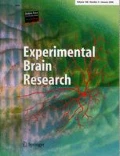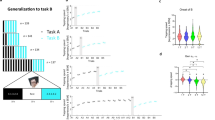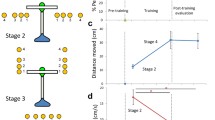Abstract.
Remarkable human performance, such as playing the violin, is often based on motor skills that, once acquired, are retained for a long time. To examine how motor skills are retained, we trained monkeys and humans extensively to perform many visuomotor sequences and examined their performance after a long retention period of up to 18 months. For both monkeys and humans, we found strong evidence for long-term retention of motor skills. Each of the monkey subjects initially learned 6–18 sequences of button presses extensively by trial-and-error for up to 18 months. After a long retention period, they were asked to perform the previously learned (OLD) sequences together with completely new (NEW) sequences. The performance for OLD sequences was much better than for NEW sequences in terms of accuracy (assessed by the number of errors to criterion) and speed (assessed by the performance time). However, the retention was interfered with in two conditions, but in selective manners: (1) Learning of other sequences during the retention period interfered with accuracy, but not speed, of performance; (2) Inter-manual transfer was absent for speed, but not accuracy, of performance. The human subjects performed basically the same task as the monkeys. Each subject initially learned one sequence of 20 button presses by trial-and-error during an 8–10 day learning session. After 16 months, they were asked to perform the previously learned sequence (OLD sequence) and additional sequences including RECENT sequences (learned one day before) and NEW sequences. Their performance was considerably better on OLD and RECENT sequences than NEW sequences. Whereas the number of errors (reflecting 'accuracy') was lower for RECENT than for OLD sequences, the performance time (reflecting 'speed') was shorter for OLD than for RECENT sequences. Interestingly, the subjects were unaware that they had experienced OLD sequences. The results suggest that a motor skill is acquired and retained in two different forms, accuracy and speed. This occurs separately but concurrently. This conclusion is consistent with the hypothesis that at least two neural mechanisms operate independently to represent a motor skill.
Similar content being viewed by others
Author information
Authors and Affiliations
Additional information
Electronic Publication
Rights and permissions
About this article
Cite this article
Hikosaka, .O., Rand, .M., Nakamura, .K. et al. Long-term retention of motor skill in macaque monkeys and humans. Exp Brain Res 147, 494–504 (2002). https://doi.org/10.1007/s00221-002-1258-7
Received:
Accepted:
Issue Date:
DOI: https://doi.org/10.1007/s00221-002-1258-7




